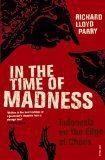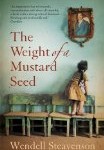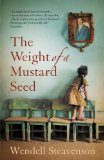Five words from the blurb: Indonesia, violence, cannibalism, besieged, crisis
People Who Eat Darkness is my favourite true-crime book so I was excited to read another of Richard Lloyd Parry’s books. Unfortunately In the Time of Madness wasn’t in the same league and I found the brutality too much to bear.
In 1997 Richard Lloyd Parry found himself in Indonesia, reporting on the elections there. By chance he heard about the terrible violence that was taking place in other areas of the country and decided to investigate it. This led him to witness some of the most savage violence in recent history; including beheadings and cannibalism.
Richard Lloyd Parry is a fantastic journalist, clearly explaining the situation without bias or sentimentality. I loved the way that this book explained the history of Indonesia to me. I was aware of the violence that took place there, but I have to admit that I didn’t know the reason behind it or anything about the different tribes at war with one another. Unfortunately his lack of emotion was a problem for me. It was good to read that it troubled him too:
I had never worked in such conditions before, and nor had anyone I knew. The experience produced two contradictory reactions. The first was relief, together with a guilty pride, in finding myself unable to confront horror without nausea or fear. The second reaction took the form of more troubling questions, which nagged me at odd moments. Why wasn’t I more upset my this? What was wrong with me? I don’t know what to call such an emotion, but it is something close to shame.
The graphic (but never gratuitous) descriptions of violence were too disturbing for me and I found myself skimming sections to avoid adding the terrible imagery to my brain. As the book progressed I was skipping more than I was actually reading. It lacked mystery/intrigue and it didn’t have the outstanding structure of People Who Eat Darkness so there was no imperative to read on. In the end I had to admit this book wasn’t for me and I abandoned it at about the half way point.
If you have an interest in the history of Indonesia then this book is a must-read, but don’t go near it if you have a delicate nature.
DNF






